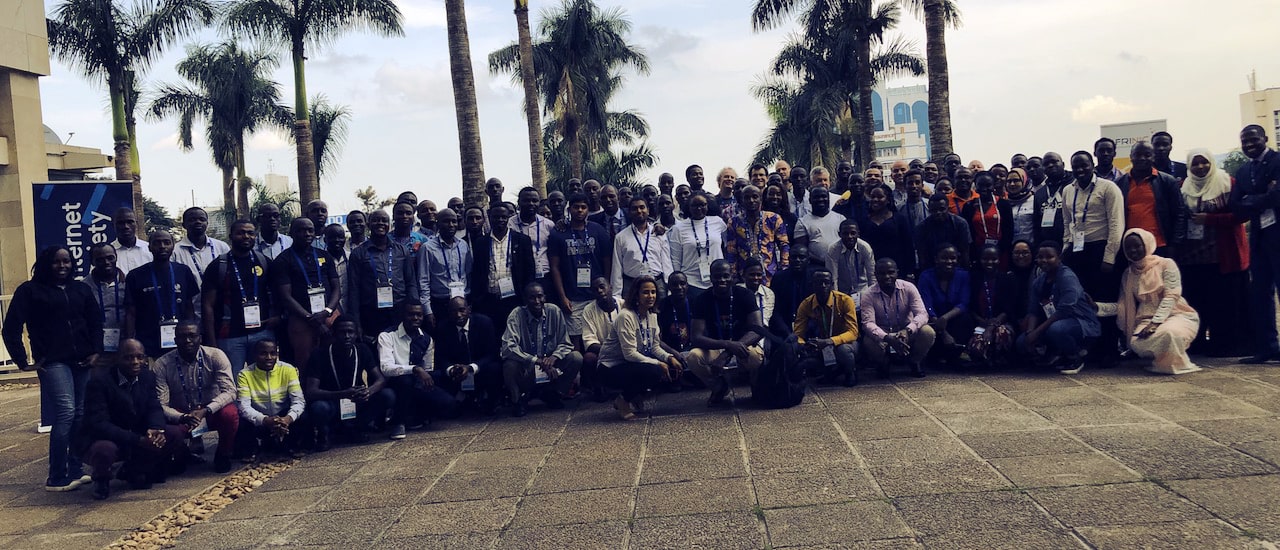What is Hackathon@AIS?
The Internet, with its endless supply of knowledge and information, has become a strategic element in nearly all economic endeavors in Africa. To build tactical awareness among primary stakeholders as well as resiliency and robustness into Internet-enabled grids, the Internet Society and AFRINIC have organized the third Hackathon@AIS event, which is taking place in Kampala, Uganda, from 19-20 June 2019.
Network engineers, software developers, and computer science students from across Africa are gearing up for another round of collaborative computer programming aimed at introducing participants to existing and evolving Internet standards development that can help further their careers through shared skillsets.
The first Hackathon@AIS was held in 2017 in Nairobi and attracted 39 participants from 12 countries. The second event, held in 2018 in Dakar, attracted 75 participants from 15 countries. Both events consisted of three different tracks led by expert facilitators from across the globe. This year, the event consists of five tracks spanning different fields, and again we’ve called on expert facilitators from around the world to share their expertise and guidance.
The Hackathon is a breeding ground for talent that can change the world through innovation and create productivity and efficiency in business. Participants will meet new people with different talents, forming “super teams” – with skilled mentors to guide participants down the right path of on-demand service delivery.
Why Are We Doing It?
The goals of the Hackathon@AIS are to expose engineers to the development process of open Internet standards and to identify strong individuals who can contribute to open Internet standards in the region. Historically, participation from the African region has been low and this event aims to encourage engineers to contribute to open Internet standards. This year, approximately 400 participants applied and more than 100 are attending the event. Please visit the event web page: https://hackathon.internetsummitafrica.org
Testimonials from the Trainers
Fred Baker has been working in data communications since 1978, including 22 years at Cisco and 30 years in the IETF. He now co-chairs IPv6 Operations in the IETF and the Root Server System Advisory Committee in ICANN. “This is my first Hackathon as a trainer,” Fred said. “I’m learning as I prepare, and hope to be a benefit to those I work with.”
Loganaden Velvindron, currently working at AFRINIC and the Regional Internet Registry, said, “During the Hackathon@AIS event, I will be working on network time security with Jeremie Daniel, a brilliant student from the University of Mauritius and member on cyberstorm.mu, as well as Christer Weinigel. So far I have attended two Hackathon@AIS events as a trainer. During the first hackathon, students were able to implement part of a spec in FreeBSD, DragonflyBSD, and NetBSD. In the last Hackathon, students were able to implement privacy in a Python NTP implementation, and a single line was added to that draft in the NTP working group to make the draft better. We hope that participants will prepare before they come so that we can move faster during the training sessions.”
Charles Eckel, a developer advocate with a passion for open source and standards, and recognized champion of open source, standards, and interoperability, runs DevNet’s Open Source Dev Center at Cisco, which focuses on Cisco’s major open source contributions, use, and community engagements. He also runs Code Exchange, which helps developers discover, learn, build, and collaborate on curated GitHub projects to jumpstart work with Cisco platforms, products, APIs, and SDKs. Charles introduced open source hackathons into IETF, revolutionizing the way IETF operates and uniting open source software with standards to maximize the pace and relevance of both. The first Hackathon@AIS was modeled after the IETF hackathon as a way to increase IETF awareness and involvement in Africa. At the 2018 Hackathon@AIS, Charles led a successful project focused on network programmability, and for 2019, he is leading a new and improved version of this project. According to Charles, “the Hackathon is a great way for developers and network engineers to learn new skills while actively contributing to the deployment and improvement of IETF standards.”
Willem Toorop, a developer/researcher at the NLnet Labs, works on open standards and open source software for core Internet protocols. Willem is especially interested in delivering first class security and privacy (with DNSSEC and DNS-over-TLS) to end-users at the edges of the Internet. “Since the whole world is now using, and increasingly also dependent upon the Internet, every area in the whole world MUST be involved in the development of open standards that is taking place in the IETF,” Willem said. “Topics currently being discussed at the IETF, like consolidation of core infrastructure (like DNS), have far reaching performance and privacy consequences that might be and mean different things in different areas of the world. However, this might not be immediately apparent as the dominance of the central cloud services on the Internet overshadow the underlying infrastructure that enables them. The best way to get intimately acquainted and involved with the open network of networks that is the Internet, is to get your hands dirty and actively participate in one of the topics which are now at the heart of the debate at the IETF.”
“The Hackathons I have supervised have led to a few interesting projects,” added Willem. “Like DNSSEC name and shame, A DNSSEC secured OTR-key lookup to the Python-based Gajim XMPP client. This was also later presented at ICANN50 in London, an emoji-based identification of DNSSEC key.” Willem further noted that the Hackathons in which he has participated were all used to make implementations of drafts he was working on (many for DNS-over-TLS, authenticating upstream with DANE, etc.). The RIPE DNS measurement has also led to the DNS Thought project.
Nabil Benamar, Associate Professor of Computer Networks at Moulay Ismail University, researches topics such as IPv6, vehicular networks, DTNs, IoT, and IDNs. Author of several journal papers and IETF Internet drafts, Nabil is an IPv6 expert (he.net certified) and IPv6 trainer with many international organizations (RIPE/MENOG, AFRINIC, and Agence universitaire de la Francophonie), as well as a reviewer for Computer Communications (Elsevier), Adhoc Networks (Elsevier), Future Generation Computer Systems (Elsevier), JKSUCS (Elsevier), International Journal of Wireless Information Networks (Springer), AJSE (Springer), and IEEE Access. Nabil is a TPC member of different IEEE flagship conferences (Globecom, ICC, PIMRC, WCNC, etc.), and a member of the organizing committee for WCNC’2019.
Nabil became an expert in Internet Governance after completing the Internet Society’s Next Generation Leaders e-learning program, acting as an Internet Society Ambassador for the 2012 and 2013 Internet Governance Forums, a Google panelist at the first Arab-IGF, and an Internet Society Fellow (IETF 89, 92, 95, 99, and 103), and a Fellow to ICANN 50 and 54.
“The Hackathon is a must for the African community to increase its participation in IETF working groups, and thus participate in shaping the Internet by co-authoring drafts, RFCs, and producing standards,” Nabil said. “Such activities will also lead to hosting an IETF meeting in Africa, which has never been done so far! I think that we need to encourage such an initiative and try to organize at least two hackathons per year.” Nabil further added that the Hackathon held for the African community is an enabler of the possible production of future IETF documents co-authored by African participants. According to Nabil, it is a good idea to lead different tracks in the same hackathon. Each track demands different and specific skills: programming languages, Linux Kernel, Networking, etc.

